This is something I made because I had to make something...
You can be the judge & jury..
Wednesday, 2 April 2008
A Drunken Dream To The Tune Of Cat Power
Posted by
Bloodha
0
comments
![]()
![]()
GMO Action
ACTION ALERT: PLEASE HELP KEEP GM CROPS OUT OF EUROPE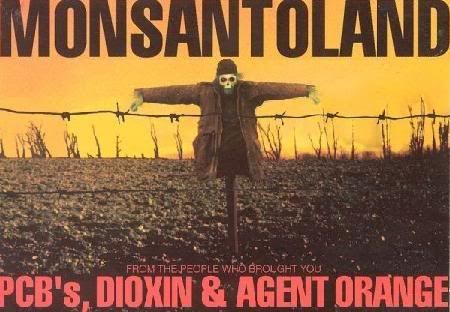
Dear friends and colleagues,
This is an urgent appeal for a few moments of your time to prevent the European Commission from approving two new GM crops for cultivation in the EU.
Last November, members of the GM-free Ireland Network were among 130,000 Europeans who signed a Greenpeace petition requesting the Commission to support a proposal made by the Environment Commissioner Stavros Dimas, to refuse the authorisation of two new Bt maize varieties in the EU. If authorised these would be the first GM crops approved for commercial release in Europe since 1998. (The only GM crop currently allowed in Europe, Monsanto's MON810 maize, is already banned in France, Austria, Hungary, Poland and Switzerland.)
Unfortunately, EU President Barroso caved in to pressure from the US Government and the agri-biotech companies. He refused to host a broad Commission "orientation debate" on GMOs, and has requested Mr Dimas to withdraw his proposal. That is why we need to take action again now.
Given the amazing public response to last November's petition (130,000 signatures in four weeks), the aim of our follow-up action is to put huge public pressure on Barroso (to convince him that he cannot deal with GMO issues behind closed doors), and to support Mr Dimas (by showing that Irish citizens wholeheartedly back his proposal to reject the Bt maize).
This time we invite you to send a picture postcard to Dimas:
You may be tempted to avoid the hassle of all the required steps (buy the postcard, buy the stamp, write a message and post it). But making this small effort will provide Mr Dimas with the opportunity to present Barroso with a mountain of postcards to indicate the support he has from the public. It will aso send a clear signal to Mr Barroso that the Commission's continued anti-democratic disregard for European citizens' objection to GM crops is not acceptable.
Action instructions:
Please send your picture postcard to EU Commissioner Mr. Stavros Dimas at the following address:
Mr Stavros Dimas
Commissioner for the Environment
European Commission
Rue de la Loi 200
1040 Brussels
Belgium
What to write on your card:
Tell Mr. Dimas you support his proposal to not legalise any more GM crops. It could be a postcard you buy or a photo you took of something important in your life such as Ireland's beautiful landscape. Urge and encourage Mr. Dimas to continue standing up to giant corporations determined control the world's food supply through patented GM crops. Express your concerns about their economic impacts on contaminated farmers. If you can't find the words, try drawing it.
Please circulate this email to friends and colleagues:
We need to spread this message as broadly as possible, since only a large number of postcards will have the desired impact on the Commission.
If you are a member of one of the 130 farm groups and other organisations in the GM-free Ireland Network, it would be great if you can distribute pre-addressed postcards to all your members. Even buying some postcards for your family, friends, and office colleagues to sign and send would make a difference.
As Mahatma Gandhi said, you have to be the change you want to see in the world!
Thank you!
Some good news! France has upheld it's ban on GMO
FRANCE UPHOLDS GMO CROP BAN
+
EU GMO FEED BATTLEGROUND
* Opponents of genetically modified crops win victory in France
International Herald Tribune, 19 March 2008.
* French council upholds decision on GMO crop ban
Reuters, 19 March 2008.
* French Farmers Lose Bid To Overturn GMO Corn Ban
AFP, 19 March 2008.
* French state body upholds decision on GM crop ban
Reuters, 19 March 2008.
* EU GMO feed battleground
Truth About Trade and Technology, 19 March 2008.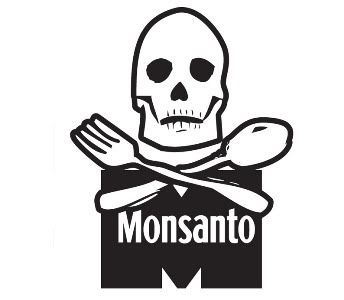
OPPONENTS OF GENETICALLY MODIFIED CROPS WIN VICTORY IN FRANCE
International Herald Tribune, 19 March 2008. By James Kanter.
PARIS: Opponents of gene-altered crops won a victory in France on Wednesday when the country's top court upheld a ban - for the time being - on a corn variety produced by the U.S. seed company Monsanto.
Growers had argued that the economic harm they faced was serious enough for the month-old ban to be lifted immediately, before the start of the spring planting season. In addition, proponents said allowing plantings could benefit consumers at a time of rising food prices.
The Conseil d'état maintained the ban on the variety, known as MON810, until it could rule on its scientific underpinning. Hearings in that case are expected to be held in the coming months.
In his ruling, Judge Jean-Marie Delarue pointed out that a report, issued in January by a committee of French experts, had called for more studies on the product's safety.
French officials were correct to have paid attention to "new elements brought to light by the committee that could be seen as posing a grave risk to the environment," Delarue wrote.
Continued here>>>>
Lots more info HERE.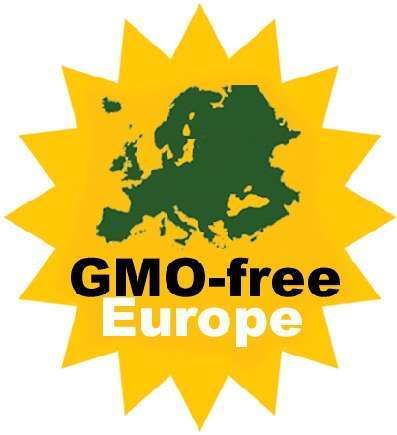
Posted by
Bloodha
2
comments
![]()
![]()
Monday, 31 March 2008
Global Warming?? Wrong!
New derivation of equations governing the greenhouse effect reveals "runaway warming" impossible That was until he learned the details of a new theory of the greenhouse effect, one that not only gave far more accurate climate predictions here on Earth, but Mars too. The theory was developed by another Hungarian scientist, Ferenc Miskolczi, an atmospheric physicist with 30 years of experience and a former researcher with NASA's Langley Research Center. After studying it, Zágoni stopped calling global warming a crisis, and has instead focused on presenting the new theory to other climatologists. The data fit extremely well. "I fell in love," he stated at the International Climate Change Conference this week. "Runaway greenhouse theories contradict energy balance equations," Miskolczi states. Just as the theory of relativity sets an upper limit on velocity, his theory sets an upper limit on the greenhouse effect, a limit which prevents it from warming the Earth more than a certain amount. How did modern researchers make such a mistake? They relied upon equations derived over 80 years ago, equations which left off one term from the final solution. Miskolczi's story reads like a book. Looking at a series of differential equations for the greenhouse effect, he noticed the solution -- originally done in 1922 by Arthur Milne, but still used by climate researchers today -- ignored boundary conditions by assuming an "infinitely thick" atmosphere. Similar assumptions are common when solving differential equations; they simplify the calculations and often result in a result that still very closely matches reality. But not always. So Miskolczi re-derived the solution, this time using the proper boundary conditions for an atmosphere that is not infinite. His result included a new term, which acts as a negative feedback to counter the positive forcing. At low levels, the new term means a small difference ... but as greenhouse gases rise, the negative feedback predominates, forcing values back down. NASA refused to release the results. Miskolczi believes their motivation is simple. "Money", he tells DailyTech. Research that contradicts the view of an impending crisis jeopardizes funding, not only for his own atmosphere-monitoring project, but all climate-change research. Currently, funding for climate research tops $5 billion per year. The equations also answer thorny problems raised by current theory, which doesn't explain why "runaway" greenhouse warming hasn't happened in the Earth's past. The new theory predicts that greenhouse gas increases should result in small, but very rapid temperature spikes, followed by much longer, slower periods of cooling -- exactly what the paleoclimatic record demonstrates. However, not everyone is convinced. Dr. Stephen Garner, with the NOAA's Geophysical Fluid Dynamics Laboratory (GFDL), says such negative feedback effects are "not very plausible". Reto Ruedy of NASA's Goddard Institute for Space Studies says greenhouse theory is "200 year old science" and doubts the possibility of dramatic changes to the basic theory.
Miklós Zágoni isn't just a physicist and environmental researcher. He is also a global warming activist and Hungary's most outspoken supporter of the Kyoto Protocol. Or was.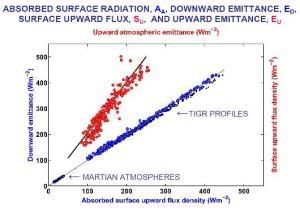
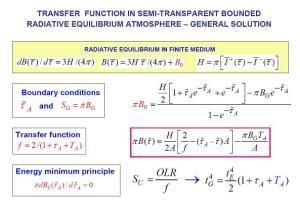
Miskolczi resigned in protest, stating in his resignation letter, "Unfortunately my working relationship with my NASA supervisors eroded to a level that I am not able to tolerate. My idea of the freedom of science cannot coexist with the recent NASA practice of handling new climate change related scientific results."
His theory was eventually published in a peer-reviewed scientific journal in his home country of Hungary.
The conclusions are supported by research published in the Journal of Geophysical Research last year from Steven Schwartz of Brookhaven National Labs, who gave statistical evidence that the Earth's response to carbon dioxide was grossly overstated. It also helps to explain why current global climate models continually predict more warming than actually measured.
Miskowlczi has used his theory to model not only Earth, but the Martian atmosphere as well, showing what he claims is an extremely good fit with observational results. For now, the data for Venus is too limited for similar analysis, but Miskolczi hopes it will one day be possible.
Posted by
Bloodha
0
comments
![]()
![]()
Processed Meat = 20% Increased Risk Of Cancer
Eating just one sausage or approximately three rashers of bacon a day can increase the risk of developing bowel cancer by a fifth, an expert warned yesterday.
Studies show that just 50g of processed meat daily increases the chances of getting bowel cancer by around 20pc.
The charity, World Cancer Research Fund (WCRF), said more needed to be done to get across the message that people who eat processed meat regularly are putting their health at risk.
Professor Martin Wiseman, medical and scientific adviser for the WCRF, said there was convincing evidence of a link between processed meats and cancer.
Processed meat is defined as that which is preserved by smoking, curing, salting or the addition of preservatives.
Examples include ham, bacon, pastrami, salami, hot dogs and processed sausages.
Hamburgers and minced meat count if they have been preserved with salt or any chemical additives.
Prof Wiseman said "We are more sure now than ever before that eating processed meat increases your risk of bowel cancer and this is why WCRF recommends that people avoid eating it.
"The evidence is that whether you are talking about bacon, ham or pastrami -- the safest amount to eat is none at all.
"When you consider that eating 50g of processed meat a day can increase your risk of bowel cancer by about a fifth, it is clear that you can make a positive difference by cutting out as much as possible.
"We do recommend that people avoid it completely, but it is not a case of all or nothing.
"Cutting down the amount of processed meat you eat can also reduce your risk of developing bowel cancer.
"But we need to do more to get this message across because if two thirds of people don't know about the link between processed meat and bowel cancer, then they are not in a position to be able to make informed decisions about whether to eat it or not."
In October, a major WCRF report warned that red meat such as beef, pork and lamb is also strongly linked to bowel cancer, although it is not as harmful as processed meat.
The report carried the recommendation that people consume less than 500g of cooked red meat per week and avoid processed meat altogether if possible.
However, red meat is also a valuable source of nutrients so the WCRF does not recommend cutting it out altogether. Bowel cancer is the third most common type of cancer in the UK, with almost 100 new cases being diagnosed every day.The charity also said there is limited evidence suggesting that processed meats may increase risk of cancers to the oesophagus, lung, and stomach.
Posted by
Bloodha
0
comments
![]()
![]()
Mobiles Phones : More Dangerous Than Smoking

Mobile phones could kill far more people than smoking or asbestos, a study by an award-winning cancer expert has concluded. He says people should avoid using them wherever possible and that governments and the mobile phone industry must take "immediate steps" to reduce exposure to their radiation.
The study, by Dr Vini Khurana, is the most devastating indictment yet published of the health risks.
It draws on growing evidence – exclusively reported in the IoS in October – that using handsets for 10 years or more can double the risk of brain cancer. Cancers take at least a decade to develop, invalidating official safety assurances based on earlier studies which included few, if any, people who had used the phones for that long.
Earlier this year, the French government warned against the use of mobile phones, especially by children. Germany also advises its people to minimise handset use, and the European Environment Agency has called for exposures to be reduced.
Professor Khurana – a top neurosurgeon who has received 14 awards over the past 16 years, has published more than three dozen scientific papers – reviewed more than 100 studies on the effects of mobile phones. He has put the results on a brain surgery website, and a paper based on the research is currently being peer-reviewed for publication in a scientific journal.
He admits that mobiles can save lives in emergencies, but concludes that "there is a significant and increasing body of evidence for a link between mobile phone usage and certain brain tumours". He believes this will be "definitively proven" in the next decade.
Noting that malignant brain tumours represent "a life-ending diagnosis", he adds: "We are currently experiencing a reactively unchecked and dangerous situation." He fears that "unless the industry and governments take immediate and decisive steps", the incidence of malignant brain tumours and associated death rate will be observed to rise globally within a decade from now, by which time it may be far too late to intervene medically.
"It is anticipated that this danger has far broader public health ramifications than asbestos and smoking," says Professor Khurana, who told the IoS his assessment is partly based on the fact that three billion people now use the phones worldwide, three times as many as smoke. Smoking kills some five million worldwide each year, and exposure to asbestos is responsible for as many deaths in Britain as road accidents.
Late last week, the Mobile Operators Association dismissed Khurana's study as "a selective discussion of scientific literature by one individual". It believes he "does not present a balanced analysis" of the published science, and "reaches opposite conclusions to the WHO and more than 30 other independent expert scientific reviews".
Source: The Independant
Posted by
Bloodha
0
comments
![]()
![]()






.jpg)







